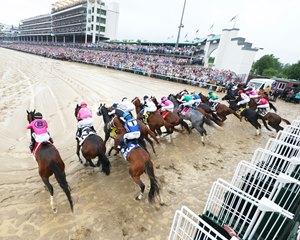Beshear Suggests Further Restricting Derby Attendance


Speaking during his daily news briefing Aug. 4, Kentucky Gov. Andy Beshear suggested he would like to see the crowd "thinned out" and some changes made by Churchill Downs in its COVID-19 plan to allow limited spectators at the Kentucky Derby Presented by Woodford Reserve (G1) Sept. 5.
His response came after officials at the Indianapolis 500 announced Tuesday that they would not run the race in front of fans. Officials there had planned to conduct the race at a 50% capacity.
The Louisville track announced June 25 that after consulting with Beshear and Kentucky public health officials, the Derby would take place under strict guidelines and with restricted attendance, a number expected to fall far below the 150,729 that attended the race last year. Though Churchill Downs did not specify a specific attendance figure, the track's plan submitted to Beshear in late June and obtained by BloodHorse via an open records request called for outdoor reserved seating areas to be reduced 57%, some dining areas reduced up to 33%, and some ticket types eliminated to further reduce crowd size.
That plan, which was approved before a spike of COVID-19 positives across much of the country last month, also called for general admission, or infield access, to be reduced up to 61%. In a conference call to discuss company financials last week, Churchill Downs Inc. CEO Bill Carstanjen said the sale of general admission tickets was suspended as a safety precaution.
During that call, Carstanjen emphasized the Derby's importance to the "social fabric of our community and the country." The event is not only lucrative for CDI, it provides a boon to the local and state economy.
"If it were today, we'd want to see some changes, and I think Churchill Downs would, too," Beshear said during the briefing. "What we do want to see is where we are a week from now. But do I believe that if done right there can be some fans? Then yes. I do believe there can be some. And the level would really depend on where we are with the virus and then the plan. But it's a huge complex to spread them out."
Beshear said Carstanjen reached out to him to discuss Derby procedures.
"He assured me that he wants Churchill and the Derby to be safe," Beshear said. "We're going to talk early next week after we see the trends going on this week, but their commitment is to do what it takes to make it safe, and we're going to talk about that with the best data that we have by early next week. I do want to say he reached out to us, not the other way around. We would've reached out at the right time, but that was them being proactive."
The Derby, like the Indianapolis 500, draws fans from across the country, making it different from many other sporting events.
Currently, Beshear is recommending that people traveling to Kentucky from eight states with high COVID-19 positivity rates—Alabama, Arizona, Florida, Idaho, Kansas, Mississippi, Nevada, and South Carolina—quarantine for 14 days upon arrival in Kentucky. Those recommendations are not specific to the Derby.
One major sport is already taking place in front of spectators in Louisville. The Louisville City Football Club, a professional soccer team, plays at the outdoor Lynn Family Stadium, where attendance has been capped at about 5,000 to distance fans. Beshear praised the enforcement of COVID-19 safety measures by the staff there during the news conference.
Kentucky has not been hit as hard by COVID-19 as other southern states, though Beshear announced 700 new COVID-19 cases Tuesday and a positivity rate of over 5%.
Derby health restrictions will affect more than fans. In a virtual town hall conducted with horsemen Aug. 3, Churchill Downs president Kevin Flanery said the track is considering restricting backside access during Derby week to two owners per Derby horse and for the popular walkover of Derby horses. Additionally, he said jockeys coming from out of state for the Derby could be required to arrive in Kentucky by Aug. 24 under the track's preliminary plans.
These protocols, both for owners and jockeys, were not finalized at the time of the Monday meeting and could change, Flanery told horsemen.
In a statement by CDI, Tonya Abeln, the vice president of communications, said CDI remains committed to running a safe Derby and intends to "provide updates to any changes and details shortly."
